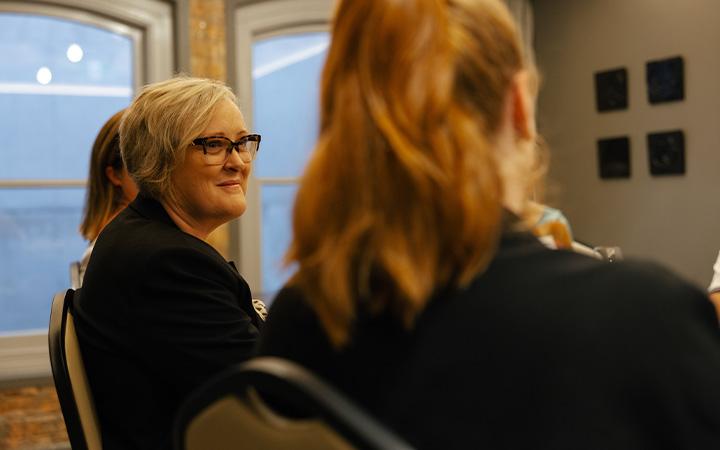People, culture, and the hard conversations
In 2020, Flight Centre Travel Group was faced with arguably its most difficult people decision. When 70% of revenue dried up overnight due to COVID, hard decisions had to be made, including scaling the workforce down from over 10,000 people to just 3,200. But ultimately, it gave the organisation a good opportunity to rethink how it would rebuild its people and culture, with a focus on the ‘Social’ element of ESG. With Head of People and Culture Allisa O’Connell playing a key role, Flight Centre Travel Group did a lot of work on creating an organisation of ‘people with a purpose’. At the recent Ideas Exchange event hosted by FCM Meetings & Events, Allisa spoke about the importance of building a people-focussed culture as part of a robust Social strategy.

People with a purpose
Out of the adversity of COVID, Flight Centre Travel Group (FCTG) emerged determined to be purposeful as an organisation. It’s a goal that was seen as aligning with employees, especially as more of Gen Z enter the workforce. Five years ago, job seekers were looking mainly for a good salary and work flexibility, however today, purposeful work is the number one focus.
Current and future employees want to know that what an organisation does matters in this world. They want to have a genuine and personal connection with your purpose and Gen Zs are asking employers how they will actually deliver on their promise of purpose. So, an organisation’s purpose needs to be genuine, and you need to communicate to the market what you are doing to make this world a better place.
And it’s not just younger employees looking for purpose. After the past few years, many from Gen X were also saying – ‘It’s too hard. Life is too short. You don't know what's going to happen tomorrow.’, Allisa tells us. Frequent comments included - “I want to have a job that satisfies my soul, not just my wallet.” and “When I go for an interview, I wonder what your employee turnover is? Your employee satisfaction? Your net promoter score? All these things that give me enough information to say I think I'm going to be happy here.”
Inclusive values
Everybody has their own set of values and they're all valid. In fact, they have become one of the biggest employee drivers. ‘If I think about why people stay at FCM Meetings & Events and Flight Centre, it’s the overwhelming sense of connection they have to what the organisation stands for. Employees are looking for a company that is the right cultural fit. But it must be authentic, because when people join a new company, they want to know and feel like they belong.’ Allisa explained.
In the more recent past, an interview process would include the organisation asking the candidate, ‘what will you bring us?’. Now employees are saying, ‘why would I choose your organisation?’. With effective full employment in the economy at present, it’s an employees’ market. Attracting good people is competitive and if salary isn’t the main driver, you need to have another way to bring people in – that’s where being able to demonstrate your culture and values is crucial.

Wellbeing and a culture of care
The other big people topic discussed at the recent Ideas Exchange event was social connection and the significance of wellbeing in the workplace. While wellbeing is essential in all its forms, there is an increasing focus nationally on mental wellbeing. In fact, the Victorian government recently legislated that the responsibility of a psychologically safe workplace is the employer's issue. This movement follows the idea that people need to come to work knowing it is safe for them and the government is saying it is an employer's responsibility to create the right environment.
With the rise of Gen Z, there is also awareness that certain things that previous generations find acceptable, would be questioned by Gen Z. Community sensibilities are constantly shifting and organisations need to adapt to changing expectations. As the Ideas Exchange group discussion explored, this is currently being seen with the rewriting of Roald Dahl's books to edit out certain language, and new examples are often coming forward. ‘I think each generation makes the generation before a little bit better. So, Gen Z are saying, "we actually know better, we're asking you to do better."’ Allisa shared.
‘Organisations need to look at how to create a workspace that allows someone to say, "Hey, what you just said then actually offended me." Because that's what you want – a culture that is open to you calling out something they feel isn’t okay.’

Diversity, Equity & Inclusion - It is more than a catchphrase!
As organisations address their people values, culture and employee wellbeing, they are embarking on an important journey. “The big buzzwords in HR at the moment are human-centric leadership. It’s about saying, ‘I'm a human and you are a human – so what's our point of connection?’ And the more points of connection we have, the less resistance there is.”
One of the biggest pieces in this people puzzle is DEI – Diversity, Equity and Inclusion. For the longest time, companies thought diversity was simply about finding an equal balance of men and women in the workplace. However, it is so much broader today and the bigger issue is – are we thinking about people with different accessibility issues?
Are we thinking about LGBTQIA+? Are we thinking about people from different cultures, different ages, and neurodiversity?
Allisa explained “All these factors make up DEI in the workplace and, importantly, 4% of the Australian population identifies as first nations. If we are not thinking about how first nations people turn up in our businesses, we're missing an opportunity because the more different genders, nationalities, backgrounds, cultural experiences and religious views you have sitting around a table, the richer your problem solving.”


